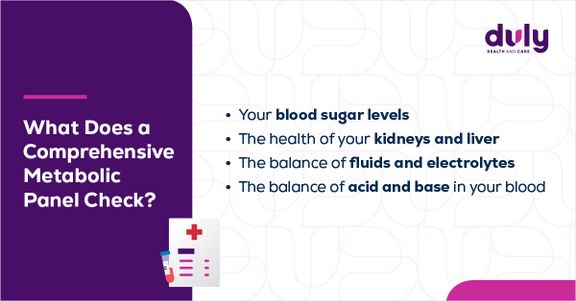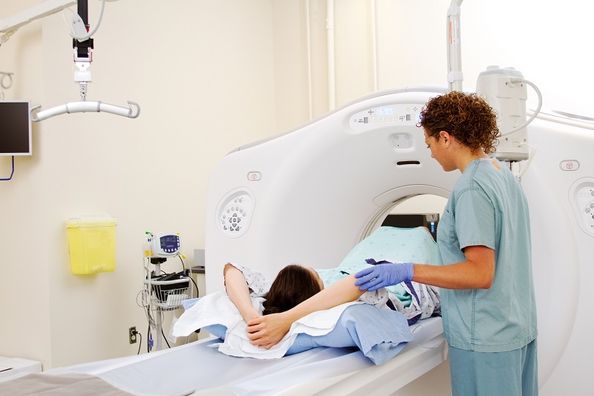Blood tests tell your doctor what a stethoscope cannot. During your annual physical, the comprehensive metabolic panel gives your doctor important insights about your health beyond basic exams.
A comprehensive metabolic panel (CMP) helps your doctor identify early signs of health issues, check how well your kidneys and liver function, see how your body responds to medications, or establish your baseline health during routine visits. This blood test measures 14 different substances to paint a picture of your overall well-being.
CMPs are similar to basic metabolic panels (BMPs), but CMPs also include six additional liver enzyme and protein tests. Both are different from complete blood counts (CBCs), which measure your blood cells, platelets, and hemoglobin.

However, reading your comprehensive metabolic panel results can be confusing and overwhelming. Here’s how to interpret your CMP results and what they might say about your health.
When was the last time you had a comprehensive metabolic panel? More importantly, did you understand what those numbers meant for your health?
Our doctors take the time to walk through your results with you, explain what they mean. Schedule an appointment with a Duly Health and Care primary care physician today to create a personalized plan to achieve your health goals.
Find Primary Care near you >
How to Read Your Comprehensive Metabolic Panel Results
When you receive your CMP results, you’ll see 14 specific substances, along with a number. This shows how much of each substance is in your blood. Your healthcare provider uses these values to spot potential health issues early, pinpoint the cause of existing symptoms, or track how well your current treatments are working, including checking for any medication effects on your liver or kidneys.
Normal Ranges for Substances in CMP Test
- Albumin: 3.4 to 5.4 g/dL (1 to 54 g/L)
- ALP (alkaline phosphatase): 1 to 130 U/L
- ALT (alanine aminotransferase): 1 to 36 U/L
- AST (aspartate aminotransferase): 1 to 33 U/L
- BUN (blood urea nitrogen): 6 to 20 mg/dL (2.14 to 7.14 mmol/L)
- Chloride: 96 to 106 mEq/L (96 to 106 mmol/L)
- CO2 (carbon dioxide): 23 to 29 mEq/L (23 to 29 mmol/L)
- Creatinine: 0.6 to 1.3 mg/dL (53 to 114.9 µmol/L)
- Glucose (sugar): 70 to 100 mg/dL (3.9 to 5.6 mmol/L)
- Potassium: 3.7 to 5.2 mEq/L (3.70 to 5.20 mmol/L)
- Sodium: 135 to 145 mEq/L (135 to 145 mmol/L)
- Serum calcium: 8.5 to 10.2 mg/dL (2.13 to 2.55 mmol/L)
- Total bilirubin: 0.1 to 1.2 mg/dL (2 to 21 µmol/L)
- Total protein: 6.0 to 8.3 g/dL (60 to 83 g/L)
Also Read: Your Guide to Your Annual Wellness Visit
Substances Measuring Kidney Function:
- BUN (blood urea nitrogen): A normal waste product that your kidneys filter out of your blood. If kidney function slows, BUN levels can go up.
- Creatinine: A normal waste product of muscle activity. Too much of it can indicate problems with your kidneys.
Substances Measuring Liver Function:
- Albumin: A protein made by your liver. It moves substances (like hormones and medication) through your bloodstream and keeps fluid in your blood vessels.
- ALP (alkaline phosphatase): An enzyme found in your kidneys, liver, and bones. Its exact function isn’t known, but it’s connected with health conditions like tissue damage and problems with bodily processes.
- ALT (alanine aminotransferase): An enzyme found primarily in your liver and is used to assess the health of your liver.
- AST (aspartate aminotransferase): An enzyme found in the liver, muscles, and heart and is used to assess the health of your liver.
- Total bilirubin: A normal waste product made from breaking down red blood cells. A buildup of bilirubin can indicate liver problems.
- Total protein: Molecules that help your body heal, build muscle, fight infections, and stay healthy.
Substances Measuring Electrolytes:
- Chloride: An electrolyte that helps control fluid levels and maintain balanced acidity in the blood.
- CO2 (carbon dioxide): An electrolyte that helps control fluid levels and maintain balanced acidity in the blood.
- Potassium: A mineral that helps your heart beat regularly and muscles work properly.
- Sodium: A mineral found in many foods. A buildup of sodium can indicate kidney problems.
Other Substances Measured in CMP Panel:
- Serum calcium: A mineral (which is mostly stored in your bones, but also in your blood) that helps with blood clotting, maintaining a regular heartbeat, and nerve function.
- Glucose (sugar): A type of sugar that provides energy for your brain and body. High glucose levels can be a sign of diabetes.
What if One of the Substances in My CMP is Out of the Normal Range?
A comprehensive metabolic panel is designed to give an overview of your health. If one or more CMP results are abnormal, it may indicate health conditions, such as liver disease, kidney disease, diabetes, or high blood pressure.
However, a high or low number is not always an indication of a problem on its own. Usually, further testing needs to be done if one of the substance levels falls outside the normal range.
Several things can affect your CMP results, like eating before the test, recent exercise, certain medications, pregnancy, or not drinking enough water. If your doctor sees unusual numbers, they might ask you about these factors, suggest testing again, or order more tests to get the full picture.
Also Read: Blood Work Basics: What to Know About Your Test
If you have questions about your CMP, talk to your healthcare provider. They can explain what your numbers mean and what they might reveal about your health.
Comprehensive Metabolic Panels: A Window Into Your Health
CMPs are a great way to keep an eye on your health by detecting or monitoring health conditions. They give a view of what’s happening in your body and whether processes are occurring as they should, all with a simple blood test.
Along with other screening tests and regular health checkups, CMPs help you and your provider stay on top of your health now and for years to come.
Health Topics:





